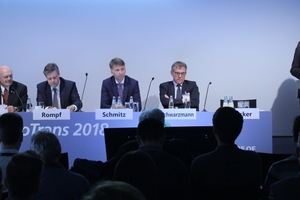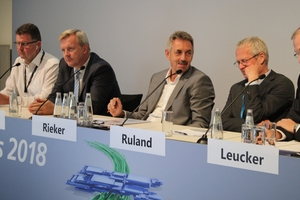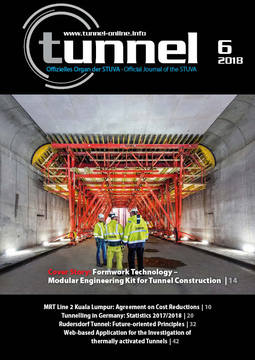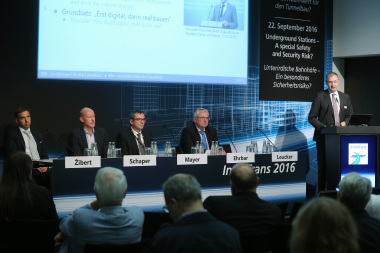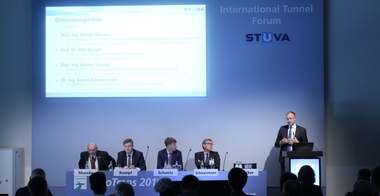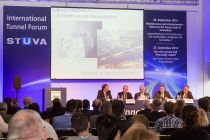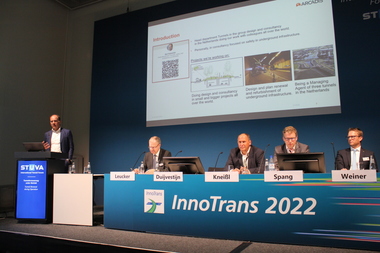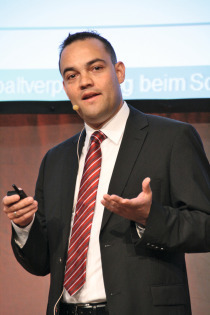International Tunnel Forum: Construction and Maintenance of the Transport Infrastructure
As part of the trade fair InnoTrans 2018 in Berlin, the German Research Association for Tunnels and Transport Facilities (STUVA) once again organised the “International Tunnel Forum” in the CityCube on the Messe Berlin exhibition grounds. STUVA managing director Dr.-Ing- Roland Leucker greeted about 130 guests on the two days to informative expert panels.
The great interest of the audience was reflected in the lively question and discussion sessions. The subjects of the forums were mostly, as stated in the title of the event, aimed at tunnel construction, but the moderated discussion sessions also were run with a wider context on both days. The basic question discussed by both the experts on the podium and the members of the audience was the maintenance and extension of an efficient and modern infrastructure to serve the growing demand for mobility and ensure well organised goods transport with sufficient capacities for the present and the future. Can the achieved level be maintained and improved? If yes, with what measures? How can infrastructure be financed, what is the role of the various forms of transport and where are the problems with approval, design and finally construction on the sites? Regarding the situation in Germany, the discussions were based on the current transport routes plan, under which about 270 billion euros are available in the federal budget for the maintenance and new building of transport infrastructure in the country until 2030.
Current Challenges and Long-term Aims
The first forum was held under the title “Long-term aims in tunnel building: Investment strategies for construction and refurbishment”. Moderator Roland Leucker welcomed the following experts for the podium discussion: Dr.-Ing. Rainer Schwarzmann, managing director of TTK – TransportTechnologie-Consult Karlsruhe GmbH (Germany); Dipl.-Ing. Martin Muncke, senior strategy expert, Asset Management and Strategic Planning, ÖBB-Infrastruktur AG (Austria); Prof. Dr. Dirk Rompf, board member for Network Planning and large-scale Projects, DB Netz AG (Germany) and Dipl.-Ing. Martin Schmitz, Managing Director Engineering Sector, Association of Transport Companies (Germany).
Martin Muncke explained how the existing railway lines will be made more efficient by four-track widening: sorting of the various types of train from express to goods has already solved a number of capacity problems. Digitalisation of railway traffic regulation through the complete introduction of ETCS (European Train Control System) will also result in shorter cycle times on the existing network. The conversion to ETCS in Austria should be completed by 2035
“The future of rail is digital”, confirmed Dirk Rompf. He described the change of passenger behaviour – away from private transport – as without alternative. Improvement of the rail network would help to solve traffic congestion problems, to comply with climate aims and cope with the growth of urban areas. In this connection, Rompf also mentioned the role of German Railways as a driver for tunnel building and steted: “Tunnel building in Germany is not at an end.”
Martin Schmitz confirmed the important place of tunnel building for regional public transport: “for environmentally friendly mobility, we have to go below ground in order to create new routes for trains.” This would be equivalent to a turnaround in the estimation of Rainer Schwarzmann: “motorised private transport has grown much more strongly than public transport in the past. Just to regain the relationship of the 1990s, “public transport services in Germany would have to be doubled.”
The second forum on the following day was held under the title “Current challenges in tunnelling and tunnel operation”. The panel members on the podium were: Chris Dulake, Civil Engineer, Major Project‘s Portfolio Director, Mott MacDonald (UK), Dr.-Ing. Stefan Franz, Project Director, DEGES – German Unity Federal Motorway Planning and Construction Management Company (Germany); Dr.-Ing. Klaus Rieker, Managing Director of the Tunnelling Division, Wayss & Freytag Ingenieurbau AG (Germany) and Dr.-Ing. Peter Ruland, director, Ramboll Transport GmbH (Germany).
This round of discussion was primarily concerned with the important subjects of the shortage of skilled staff, slow approval procedures and fair contract arrangements for construction projects.
With a view to the transport routes plan, Stephan Franz from the DEGES described infrastructure construction in Germany just as provocatively as clearly “we have great amounts of money – but there is more of a bottleneck in planning than in investment.” One reason he mentioned: job cutting in the administration of road building and the resulting loss of competence – “we have to promote new recruitment here.” Klaus Rieker sees this very similarly with reference to the entire industry: the money for construction is there and the order books in the construction industry are full. The current lack of trained staff is however considered to be a “high risk” by the main association of the German construction industry. “The number of civil engineering graduates has indeed increased greatly”, said Rieker, “but they will still not cover the current demand.”
It is simply not sexy to be a civil engineer at the moment, maintained Peter Ruland, although digital design and Building Information Modeling is something that could raise the enthusiasm of young people again. More money could also increase enthusiasm: “civil engineers are worse paid than mechanical or electrical engineers. This naturally reduces the attractiveness.”
There was great unanimity in the views on the subject of approval procedures: it must happen faster and more simply. In Germany, improvement is in sight with the planning acceleration law of the transport ministry BMVI. Peter Ruland also spoke quite directly about the misuse of the available legal options in Germany in order to delay or stop projects: “That environmental actions last two years is absurd, out of all proportion.” He would rather see a single-stage approval procedure for major construction projects run by an authority or also parliamentary decisions – not however through the courts. “The aim of preserving an intact environment should however not be questioned”, said Ruland. The fact that the public participation is not a secondary marketing gag but can be of vital interest for a project had already been stated by Dirk Rompf from the DB on the previous day. “The correct approach is public participation right from the start. We have had to learn this the hard way: when people are once sitting in the trees, it is difficult to get them down again.”
Marvin Klostermeier, Redakteur/editor tunnel

